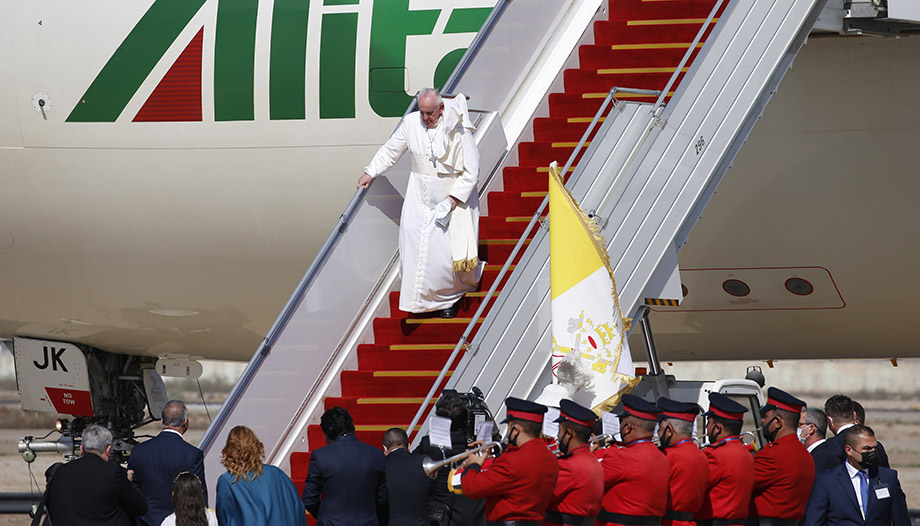"Thank you for inviting me to speak to our Spanish-speaking friends! Shlama o shina o taibotha dmaria saria ild kol! which in Aramaic means 'peace, tranquility and God's grace be with you all'.Aram, who studied philosophy and theology at the Baghdad seminary and was ordained a priest on September 9, 2011, greeted.
Now, after almost 10 years as a priest, Aram Pano, sent by his bishop, is studying Institutional Communication at the Pontifical University of the Holy Cross in Rome. "because the world needs each one of us to contribute to evangelization. And especially in these times, in order to proclaim the Gospel, it is necessary to know the digital and communication culture I have great hope for the future".
Aram Pano views Pope's visit to Iraq "in the optics of the encyclical 'Fratelli tutti' (Brothers all) of Pope Francis, for this is what my country needs: fraternity. So all the Christians of Iraq hope that this trip will change something."said at the online meeting of the CARFThe Foundation, an institution that is helping numerous priests, lay people, religious and seminarians to further their studies and training.
The young priest sang the Our Father in Aramaic, the language of Jesus and the common language of many people after two thousand years, and he explained that "in fact Aramaic, in the Eastern Syriac dialect, is my mother tongue and the language of all the inhabitants of the area where I was born, in northern Iraq, which is called Tel Skuf, which means Bishop's Hill. It is located about 30 km from Mosul, the ancient city of Nineveh, in the Christian heart of the country.".
"Later, already in Basra, our bishop asked me to accompany him on a pastoral mission to Misan, about 170 km from Basra, where there were twenty Christian families, and there my vocation emerged."
"Many complicated problems."
Regarding Iraq's problems today, Aram Pano notes. "lack of honesty and unwillingness to rebuild the country, Muslims who have separated, the government thinks more about being loyal to neighboring countries than the welfare of its citizens... There is not one problem but many complicated problems." In his opinion, "Politics, the service to the citizen, does not exist, because it is in the hands of others outside Iraq. However, the fruit of God's work is not within our reach and we pray that through this trip peace, the love of Christ and unity will be proclaimed for a people who can no longer bear it".
Important interfaith context
The meeting was also attended by the Italian writer Gerardo Ferrara, an expert on the history and culture of the Middle East. "It is a historic moment for all Christians in the world, and especially for this country."said Ferrara, who explained that the Holy Father continues to "the footprint" John Paul II, who wished to begin the Great Jubilee of the Year 2000 with a pilgrimage to Iraq, "for it is the land of Abraham." but was unable to do so, because of opposition first from the United States and then from Saddam Hussein.
"Abraham came from Ur of the Chaldeans, and precisely as Christians, Jews and Muslims, from a historical and religious point of view, we all believe ourselves to be descendants of Abraham." added the writer.
Just this week, the Pope emphasized, among other things, this reason for the trip: "The day after tomorrow, God willing, I will go to Iraq for a three-day pilgrimage.", y "Together with the other religious leaders, we will take another step in the brotherhood among believers. The Iraqi people waited for St. John Paul II, who could not come. One cannot disappoint a people a second time", Francisco pointed out.
At the CARF meeting, Gerardo Ferrara reviewed the ethnic and socio-political situation in Iraq, "which is very complicated". The first thing the Pope will do is to meet with the country's authorities and celebrate Mass in the Chaldean (Catholic) Cathedral in Baghdad. Then he will go to Ur. One of the oldest cities in the world. Where he will have an interreligious meeting with Jews, Christians and Muslims".
"Another important meeting." in Ferrara's opinion, "It will take place with Grand Ayatollah Al-Sistani, who is the head of the Iraqi Shiites, who are the most important ethno-religious component of the country, because they make up 60 percent of the population. Sunni Muslims are 35 percent, and then there are Christians, Yazidis, Mandaeans, and other minorities".
"Brothers all"
The Italian expert also referred, like the priest Aram Pano, to this trip as a framed visit. in the context of the encyclical 'Brothers All', and fraternity is precisely what this country needs most. Christians have asked the Pope to meet with Ayatollah Al-Sistani".said Gerardo Ferrara at the CARF colloquium.
In his video message prior to his visit to Iraq, Pope Francis has stated: "I long to meet you, to see your faces, to visit your land, ancient and extraordinary cradle of civilization. I come as a pilgrim, as a penitent pilgrim, to implore the Lord's forgiveness and reconciliation after years of war and terrorism, to ask God for the consolation of hearts and the healing of wounds. And I come among you as a pilgrim of peace, to repeat: "You are all brothers" (Mt 23:8) (Mt 23:8). Yes, I come as a pilgrim of peace in search of fraternity, animated by the desire to pray together and to walk together, also with brothers and sisters of other religious traditions, in the sign of Father Abraham, who unites Muslims, Jews and Christians in one family" (Mt 23:8)..







